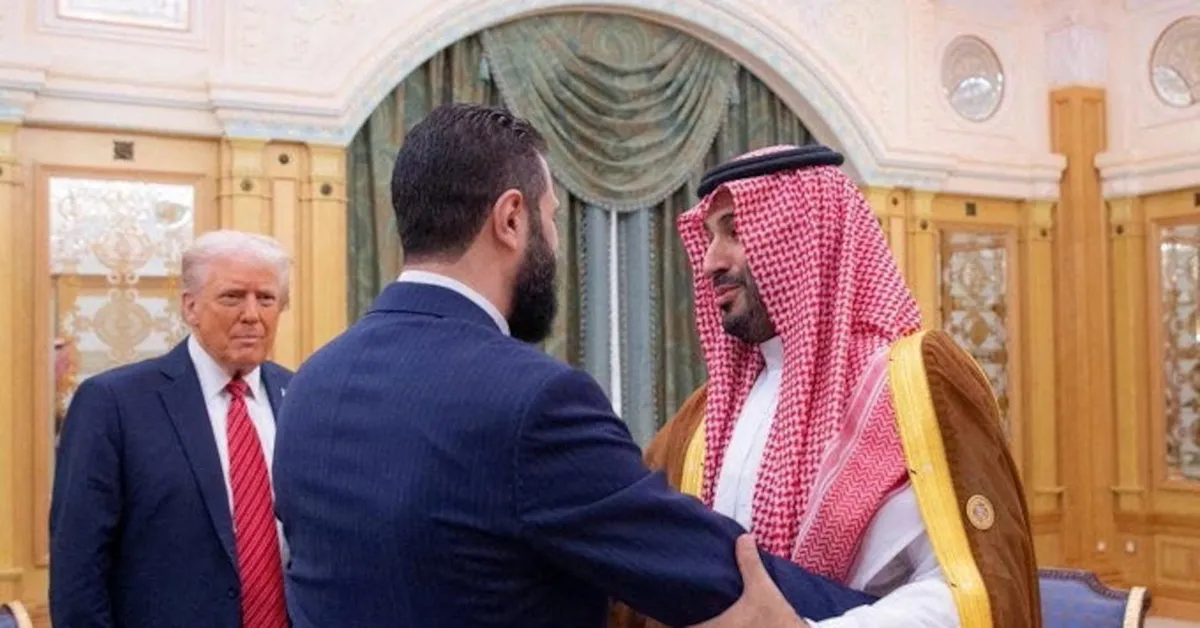
Ahmed al-Sharaa, a former al Qaeda militant, has made a remarkable transition to becoming the president of Syria. This transformative journey reached a significant milestone on May 14, 2024, when he met with U.S. President Donald Trump in Saudi Arabia. This meeting is particularly noteworthy, considering Sharaa's background as a member of al Qaeda in Iraq during the 2003 U.S.-led invasion and his subsequent years spent in U.S. custody.
Sharaa's meeting with Trump follows the President's announcement of the lifting of U.S. sanctions on Syria, marking a substantial boost for Sharaa as he endeavors to unify the war-torn nation and rejuvenate its struggling economy. Trump expressed optimism about Sharaa's leadership potential, stating, "He's got the potential - he's a real leader." This sentiment underscores the changing dynamics of U.S.-Syria relations, as Trump hinted at a desire to normalize ties with Damascus.
Sharaa ascended to power after leading an offensive by his Islamist forces from their stronghold in northwest Syria, ultimately toppling Bashar al-Assad in late 2024. With Assad's allies, Russia and Iran, preoccupied with other conflicts, Sharaa capitalized on the situation to establish himself as Syria’s de facto ruler. Known previously as Abu Mohammad al-Golani, the commander of the Nusra Front—al Qaeda's official branch in Syria—Sharaa distanced himself from the group in 2016, rebranding his faction as part of the Syrian revolution rather than a global jihadist movement.
Upon entering Damascus in December 2024, Sharaa traded his combat fatigues for suits, vowing to replace Assad's oppressive regime with a more inclusive and just governance model. His administration has prioritized reunifying Syria, revitalizing an economy hampered by sanctions, and establishing state control over arms. Support from nations like Turkey, Saudi Arabia, and Qatar has bolstered his efforts, yet challenges remain as armed groups retain their weapons, and fears of sectarian violence persist.
Despite Sharaa's ambitions, his administration faces significant hurdles. Israel has expressed concerns over Sharaa's jihadist past, declaring southern Syria off-limits to his forces. A recent strike near the presidential palace in Damascus served as a warning against any potential threats to the Druze minority in Syria. Tensions escalated in March when Assad loyalists attacked government forces, leading to retaliatory violence that resulted in the deaths of hundreds of civilians from the Alawite community, highlighting the fragility of Sharaa's rule.
In the face of these challenges, Sharaa's temporary constitution has drawn criticism for concentrating power within his administration, raising fears of a regression to authoritarianism. In public statements, he has characterized Assad's defeat as a divine victory, while skillfully avoiding direct answers regarding the implementation of Islamic sharia law, suggesting that such decisions should be left to experts.
Born in Saudi Arabia, Sharaa was influenced by his father's Arab nationalist ideology, which contrasted with his eventual embrace of political Islam. His political awakening was shaped by the second Palestinian Intifada, leading him to return to Syria to bolster al Qaeda's presence under the direction of Abu Omar al-Baghdadi. The U.S. designated him a terrorist in 2013 due to his alleged role in promoting violence and attempting to establish sharia law in Syria.
In 2013, Sharaa made headlines with his first media interview, where he advocated for a governance model based on sharia law. However, in a more recent interview with PBS’s FRONTLINE in 2021, he presented a more moderated image, arguing that the terrorist label was unjust and emphasizing his opposition to the killing of innocents. He expressed a complex view of the September 11 attacks, acknowledging the anger felt in the Arab world while also condemning the loss of innocent lives.
Although the Nusra Front maintained ties to al Qaeda, it was often perceived as less brutal in its interactions with civilians compared to other groups like the Islamic State. As Sharaa continues to navigate the turbulent political landscape of Syria, the world watches closely, hopeful for stability yet wary of the shadows of his past.